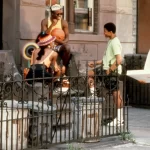Defend Your Collection!: Summer of Sam, by Craig Schroeder
This is an ongoing series that will explore the perceived anomalies in the DVD collections of BP writers. These are movies that may give someone pause when they browse your movie shelf, but we’re here to tell you why they belong in any film lover’s collection.
I’ve seen 1999’s Summer of Sam on the wrong-end of many a ranking of Spike Lee’s filmography. It’s a bizarre movie, sure. It’s a slow-burn drama about a serial killer, that isn’t really about a serial killer at all (and features over-the-top, gonzo performances by Adrian Brody, John Leguizamo and a talking dog). But it’s also a film that belongs in Lee’s canon of films–alongside 25th Hour and Do the Right Thing– that are steadfastly interested, not in the ugliness of American culture, but how American culture responds to its own ugliness.
Set against the tumultuous summer of 1977, when David Berkowitz (AKA Son of Sam) went on a killing spree in New York, Summer of Sam follows several residents of a South Bronx neighborhood. Vinny (Leguizamo) is a philandering hair dresser who is desperate to become part of the fabric of the New York club scene. Ritchie (Brody) is Vinny’s childhood friend who has reinvented himself as a sexually fluid punk-rocker. Berkowitz is a character in the film, but he is perfunctory. He’s the MacGuffin to Lee’s real interest: how an atmosphere of fear, paranoia and hatred permeates and dilutes a society. Spike Lee’s filmography–or, at the very least, the jewels in his crown–are visions of lives affected by social injustice. And Summer of Sam is no different, but its modus operandi is an anomaly in Lee’s work. While most of his films are ultra-realistic, Summer of Sam is a risky, surreal vision of 1970s New York.
Often maligned for being languid, meandering and unambitious, Summer of Sam is anything but. It merely has a difficult elevator pitch. In truth, Lee is doing some of his most important work–as is Ellen Kuras (whom Lee also worked with on He Got Game and Bamboozled), whose cinematography does a better job than any title card at capturing a place and time. By ditching some of the overt socio-political elements that defined his career to this point, but expounding on the humanity at the core of his politics, Spike Lee created a very personal film in Summer of Sam.
Full disclosure: Spike Lee’s 1989 film Do the Right Thing is on the short-list of my favorite films of all-time. But that’s not why Summer of Sam belongs in my collection; it’s more than just another film by a director I appreciate. Do The Right Thing was a revolutionary film and Summer of Sam is the unsung, spiritual successor to Lee’s seminal 1989 film. Both focus on specific kinds of people in New York, at very formative times in New York’s existence. Both focus on prejudice and hate as a way to discover passion and humanity. Summer of Sam, made twenty-three years after the events it depicts, lacks the benefit of social relevancy that made Do The Right Thing so explosive. But both have an overwhelming interest in the well-being of humanity. Do The Right Thing was the film Spike Lee was born to make. Summer of Sam is the film he dared to make.






























I haven’t seen Summer of Sam since it was in the theaters, so my opinion could totally change. At the time, my issue was that I didn’t connect at all with the main characters. Leguizamo’s character was totally full of himself, and Brody’s was just too dim-witted as the wannabe punk. I’m a big Spike Lee fan and count both Do the Right Thing and Malcolm X among my favorites. There haven’t been too many of his films that I’ve disliked, but this is one of them. I should probably give it another shot.